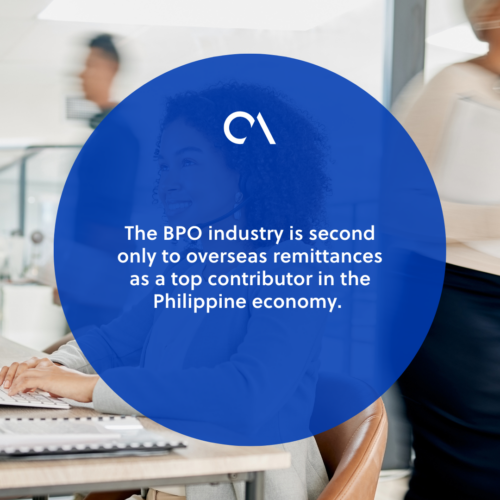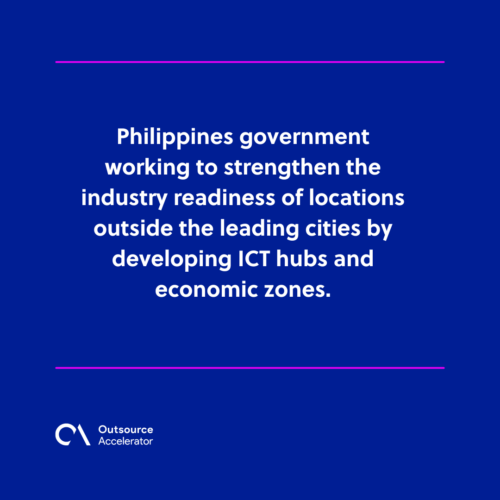Philippine outsourcing trends to watch out for

Outsourcing has changed businesses and economies around the world. Even now, it continues to generate millions of local and offshore jobs while helping businesses cut costs and maximize their profitability.
The Philippines is one of the most sought-after countries for business process outsourcing. The country, along with India, is the leading choice for global outsourcing firms.
Global companies prefer to outsource to the country due to its low costs, close cultural and language compatibility, and round-the-clock service.
Despite facing a huge blow due to the COVID pandemic, the country still has a promising future ahead of it.
Let’s take a look at the Philippine BPO market, its history, and what investors should expect in the future.
The Philippine BPO market
The BPO industry is second only to overseas remittances as a top contributor in the Philippine economy. The Information Technology and Business Process Association of the Philippines (IBPAP) reported a $26.7 billion market revenue in 2020, having a 1.4% increase from the past year.
The industry’s contributions were also recognized by the World Trade Organization in 2019. It generated 1.3 million jobs for Filipinos in the same year and accounted for 7.3% of the country’s gross domestic product (GDP).
The Philippine outsourcing market has undergone vast changes over the decades of its existence.

In the early years
Call center and software development services were the most popular outsourced services in the Philippines in its early years. Outsourcing leaders such as Accenture, Sykes, and eTelecare led the way in enabling the country to offer these functions.
Philippine outsourcing in its first decade identified its three major hubs: Metro Manila, Metro Clark, and Metro Cebu. With the initiatives of key persons such as former Department of Trade and Industry (DTI) Secretary Mar Roxas, these hubs jumpstarted the industry growth from 1992 until 2010.
2011-2016
A survey conducted by the Business Process Association of the Philippines (BPAP) and Outsource2Philippines reported over 20 voice and non-voice services offered by outsourcing companies. This proved the expanding offerings in the maturing industry at that time.
The following decade became the golden age of the industry. According to the IT-BPO Road Map 2011-2016, BPO companies expected further growth in terms of year-to-year growth, additional functions, and higher rankings.
And the industry achieved most of its goals. Years after gaining the “BPO capital” title, the country ranked second in the 2016 and 2018 Tholons Global Services Index ranking.
2017 forward
IBPAP recalibrated its IT-BPO roadmap in 2017 to further fit its new goals for the next five years. Key industry changes and objectives include:
Retaining its competitive position
As the Philippines continues to be a leading outsourcing player, it aims to retain its position while keeping its emerging competitors at bay.
Evolving verticals
The verticals that largely leverage the BPO industry are expected to further evolve in terms of regulations, capital requirements, and process optimization. This could further drive the need for outsourcing in these industries.
Overall growth
The Philippine BPO market was projected to grow at a compound annual growth rate (CAGR) of 9.2% within the following years.
Unfortunately, disruptions have slightly affected the road map projections. In 2019, the IT-BPO sector recalibrated its projected growth to 7.5% up to 2022.
The rise of freelancing, automation and reshoring triggered a slight decline in the industry’s demand. Fast forward to 2021, COVID-19 has changed the landscape for the global economy.
Global outsourcing quickly got back to its feet and experienced a spike in demand with businesses adjusting to remote work during the pandemic.
Thus, giving another chance for the Philippines and other outsourcing destinations to get back on their feet.
What to expect in the next five years
With the new normal approaching, the global outsourcing industry expects to contribute more to the global economy. This demands improvements in the industry’s landscape in terms of locations, infrastructures, and services they offer.
Luckily, Philippine government agencies are pushing for several measures towards bringing these improvements. With this, global businesses should expect the following changes that will occur in the next five years.
Next-wave outsourcing cities
In 2010, IBPAP named Next Wave Cities as alternative outsourcing hubs. The locations, most of which made it to Tholons Top Outsourcing Destination in 2016, include:
- Davao City
- City of Santa Rosa (Laguna)
- City of Bacolod
- Iloilo City
- Baguio City
- Dumaguete City
Currently, IBPAP, the Philippines Economic Zone Authority (PEZA), and the Department of Information and Communications Technology (DICT) are working to strengthen the industry readiness of locations outside the leading cities by developing ICT hubs and economic zones.

The Digital Cities 2025 initiative comes after the demand for outsourced services increased, which will generate more jobs for Filipinos. Some of the locations in the program are:
- Balanga City
- Batangas City
- Cabanatuan City
- Dagupan City
- General Santos City
- Iligan City
- Iriga City
- Metro Cavite
- Metro Rizal
- Malolos City
- Tagbilaran City
- Zamboanga City
The 25 Digital Cities will receive support in four areas: institutional development, talent attraction and development, infrastructure development, and marketing and promotion.
Outsourced services
Experts have also noted an increase in outsourced services in the coming years. For starters, companies who have already outsourced before plan to increase their efforts, especially in IT services.
Additional services are expected to increase its demand, including:
Knowledge process outsourcing (KPO)
IBPAP has seen a growing trend in knowledge process outsourcing in the country since 2017. This trend is expected to continue until 2025 with research and development being its frontrunners.
Accounting services
There’s a growing demand for outsourced accounting in the country with a concentration in billing services, accounts payables, and accounts receivables.
Recruitment processing
As businesses increase their workforce, there will also be an increase in demand for recruitment process outsourcing (RPO) to handle volumes of applications in the future.







 Independent
Independent




